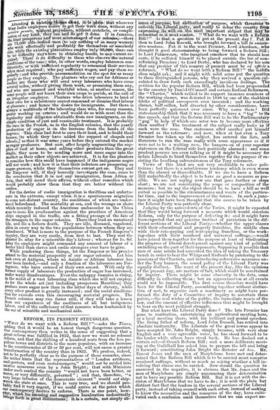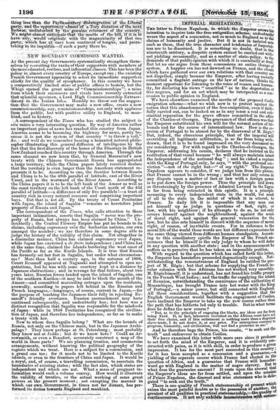REFORM, ITS PRESENT STRUGGLES.
"WHIT do we want with a Reform Bill ?"—asks the Times, adding that it would be an honest though dangerous question. Our contemporary then 'writes in the sense of suggesting that a great reform was fulfilled: in 1832, that now we want no colossal reform, and that the shifting of a hundred seats from the less po- pulous towns and districts to the more populous, with an increase th the constituencies of 20 or 30 per cent, will not cause a greater transformation of the country than in 1832. We profess, indeed, not to be perfectly clear as to the purpose of these remarks, since Ute writer hints that the representatives of "London artificers, coal:porters, and even coetermongers," would not be misled into unwise Measures even by a JOhn Bright; that with Ministers under such control the country " would not have been better, Or Worse, or very differently, governed " ; and that, therefore, "a: very large infusion of 'the democratic element" would not ship- wreck the state at once. This is very true, and 'we should pro- bably find it very cogent, if we could arrive at the point which our contemporary desires to enforce. There is one point, how- ver, which his amusing and suggestive lucubration undoubtedly brings forth in great distinctness ; it is a certain, not simply ab-
sence et'
enfeeble 9ifibittioSle; Of' se, which threateneto
10 t::11)
express§ psA foTel a,) portant slibject Md. rpt
or. fp debar the country, 7..*
submi 4,4e4iseePftne!..se 40 we want Bill?" 'Is thatiei jueetten. to inst,at the present day P,,, then to Lord John Russell, who brought forward, a bill sh sive sessions.. Put 'it • to the 'text Premier, Lord dtberdetenei who thought it good sitateerneinehips to bring forward a Reform Bill ; to Lord Piihiterstons who imagined somehow that he should, lose caste, if he suffered himself to he placed outside the list ofnon- reforming Premiers ; to Lord Derby, w'h'o has declared by his acts that any premier of this country at present must be ex bfiVeidn reformer. "What do we want with a Reform Bill ? " the 'rail:Mit class might ask ; and it might with solid sense put the question to those distinguished persons, why they revived a' question cal- culated to draw forth such exceedingly, invidious feelings. The petition for the popular Reform Bill, which had been propounded 'to' thecountry by Daniel O'Connell and certain Radical Reformers, the " Charter " which rallied to its support immense numbers of the working classes, was defeated in 1848 krone of the shabbiest tricks of political escroperie ever invented ; and the working classes, half sullen, half 'diverted by other considerations, have been perfectly quieseent ever since. Why 'mese them ? Did statesmanship think that it was necessary to have a " tag " tosits fine speech, and that the Reform Bill was to be the Pmliamentaty " gag" b1 help of which one actor was to become more effe6tive than anether ? The treatment of the subject really looks as if such were the case. One .statesman after another put himself forward as the reformer ; and. now, when at last even a. Tory Premier has taken up the subject, has entered the lists, and threatens. to run the race really with some 'appearance as if it were not to be a waiting race, the hangers-on of your superior statesmen on the Liberal side look positively alarmed ; and some prudent persons are even talking as -if it might be necessary for sedate Liberals to band themselves tegether fol. the purpose of re- sisting the headlong subversiveness of the Tory reformers. Views of this kind are not very creditable to sober poli- ticians; but there is a mischievous tendency which is even worse than the absurd Or discreditable. If we' sire to -have a R,efbrm Bill undoubtedly the object is to have as good a meastrre as IS08- sible. We are not saying now one that goes further or 'stops short; we are not considering the scope or composition of the measure ; but we say the object should be to have a bill as well suited as possible to the circumstances and wants of the particu- lar time, and to the improvement of the future. In such a junc- ture it might have been thought that the course to be taken by the Liberal Party was perfectly clear.
Judging by the antecedents of the Tories, it might be expected thaethey would bring forward a measure which would simulate Reform, only for the purpose of defeating it ; and it might have beenexpected that any genuine instinct of patriotism in the dif- ferent sections of the Liberal Party,'—whether the upper classes with their educational and property franchise, the middle class with their rate-paying and rent-paying franchise, or the work- ing-class with their manhood and universal suffrage,—would have joined them together for the purpose at least of vindicating the progress of liberal development against any kind of political swindling on the part of their opponents. Supposing it possible that men of sane minds had conceived the idea of taking the Treasury bench in order to beat the Whigs and Radicals by pandering to the passions of the Chartists, and introducing subversive measures un- der the Tory banner, the sound policy of the Liberal Party was equally distinct. The want of the present day, like the opinions of the present day, are matters of fact, which could be ascertained by inquiry. There might be some obscurity in the data, some difficulty in collecting them ; but an approximation at all events could not be impossible. The first course therefore would have been for the Liberal Party, assembling together without distinc- tion of sect, to organize such a machinery as might have per- formed the duty of a Committee of inquiry to ascertain three points,—the real wishes of the public, the immediate wants of the law, and the amount of effective influences that might be brought to bear on the next political struggle. But what have the Liberal Party done P The late Premier has gone to rustication, entertaining an agricultural meeting here, 'or a local meeting there with his brilliant and genial speeches. The living father of reform, Lord John Russell, has retired into absolute taciturnity. The Liberals of the great towns appear to have accepted Mr. John Bright, simply because, with very clear English and a very agreeable voice, he has stood forward to be the leader while others have stood. back. He has dashed out a certain rule-of-thumb Reform Bill ; and a more deliberate meet,-
ing at the Guildhall has asked him to prepare the bill and bring it forward ; constituting John Bright the dictator ad hoc. Mr.
Ernest Jones and the men of Marylebone have met and deter- mined that the Reform Bill which is to be carried must comprise manhood suffrage, without so much as asking Whether a bill in- volving that clause can be carried. Now should the question be answered in the negative, it is obvious that Mr. Jones and the men of Marylebone are simply announcing their determination not to have any possible Reform Bill. But it is not with the de- cision of Marylebone that we have to do ; it is with the plain but distinct fact that the leaders in the several sections of the Liberal party, instead of taking council with each other, instead of seeking to know the necessities and the resources of the day, have culti- vated such a confusion amid themselves that we can expect no-
thing less'. than the qliaititlintlihi' -Ale party, surd. the 'Op t ca7ory.cliqlrii: Sif ifi'lliiii Reform; ',rind i s tur se by 'el referineik. Of the 'ciiiiii We Mightlalmoat intibip: Ala Melits of' the bill, if itirr hajea'.41r*„. would origin* with 'the magnanimity of that One, partyViObieh has at once been continent of 'tongue, and pains- taking in its inquiries—if such a party there be.



























 Previous page
Previous page